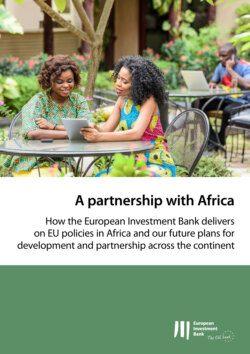Читать книгу A partnership with Africa - Группа авторов - Страница 5
На сайте Литреса книга снята с продажи.
ОглавлениеAfrica’s challenges and opportunities
Among its more than one billion people, Africa counts the youngest, fastest-growing middle class in the world. With a median age 14 years younger than any other continent, Africa is embarking upon a period in which its political, economic and social outlook will transform. Every year in sub-Saharan Africa, 20 million jobseekers enter the labour market. In ten years, growth in its workforce will exceed that of the rest of the world combined. The benefit of incorporating this labour force into the global economy could be unparalleled.
Africa is a continent of great natural wealth—oil, cobalt, platinum and phosphate. Yet poverty afflicts it. Of the ten countries with the highest percentage of the population living in poverty, nine are in sub-Saharan Africa and 32 million more descended into poverty in 2020 because of the economic effects of COVID-19. More than 70% of the people living without access to electricity in the world are Africans. The continent’s prospects are changing, however. The petroleum and mining sectors now make up a minority of long-term capital inflows, as investors have come to focus on telecommunications, retailing and services. Every day in sub-Saharan Africa, 90 000 new users connect to the internet for the first time. Africa is fast taking its place as the global centre of mobile money. This expands access to global markets, builds resilience, boosts transparency and creates jobs.
Climate change intensifies Africa’s challenges, of course, causing forced displacement and contributing to fragility. Africa suffers from the impact of climate change, but it contributes less than 4% of global greenhouse gas emissions. The Paris Agreement on climate change profoundly altered the dynamic of development by highlighting the fact that every country in the world—rich or poor—is in transition to a green, clean economy. Because of the relatively low level of industrialisation represented by its small contribution to global warming, Africa could in fact leapfrog directly into a greener future.
This green growth must also be inclusive, expanding access to basic goods such as clean energy, water and mobility, as well as education and healthcare, to ensure equal opportunities. After all, the interruptions to the education of sub-Saharan African children caused by COVID-19 alone will cost $7 000 per child in future lost earnings. Ensuring that businesses and micro-entrepreneurs have access to the finance they need is essential to addressing Africa’s huge needs for decent jobs.
A lesson from the pandemic is that the next decades will see rising risks from climate change and extreme weather events, as well as ongoing risks from conflict and the possibility of future pandemics. Achieving resilience in energy, food, education, health and business systems requires urgent investment, not least to ensure that infrastructure can withstand shocks. It requires investment to expand access to quality healthcare and digital services. It requires economic diversification and the mitigation of vulnerabilities arising from high debt and fragile financial systems.
Africans aspire to better working conditions, social rights and improved health and safety in the workplace. Health is also a necessary condition for human development and Africans deserve accessible and affordable healthcare, along with access to water, sanitation and hygiene services. In sub-Saharan Africa, electricity reaches only about half the population. About 600 million people lack electricity and 890 million cook with traditional fuels. For Africans to reach their economic and social development goals, they will need strong partners and outside investment to support their drive for affordable, reliable, sustainable, modern energy. Social and gender inclusion leads to more sustainable, long-term growth, and Africans will look for partners to accompany them on their path to more inclusive growth, with a focus on least developed and integrated regions, as well as on strengthening ties at continental level (for instance, supporting North African companies in expanding south).
Africans are at the start of a new and transformative contribution to the global economy. This document tells the story of the European Investment Bank’s part in supporting this great movement.
